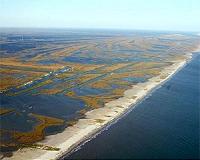 |
Montreal, Canada (SPX) Dec 02, 2010 The versatile organism Lactococcus lactis, the workhorse bacterium that helps turn milk into cheese, may also be valuable in the understanding of how microbes turn the organic compound cellulose into biofuels. New research from Concordia University, published in the journal Microbial Cell Factories, suggests the bacterium can be engineered to transform plant material into biofuels or other chemicals. Concordia biology professor Vincent Martin and his PhD student Andrew Wieczorek demonstrated how structural or scaffolding proteins on the surface of the bacteria can be engineered in Lactococcus lactis towards the breakdown of plant material. They showed how these scaffold proteins were successful in providing a stable surface outside the cell for chemical activity, e.g. the transformation of plant material into biofuels. "This is the first study to show how the scaffolding proteins, can be secreted and localized to the cell surface of Lactococcus," says Dr. Martin, who is also Canada Research Chair in Microbial Genomics and Engineering. "Exporting these proteins and localizing them to the outside of the cell is a huge milestone. This can enhance the efficiency of any bioprocesses or the breakdown of organic materials." What's promising about this research, stresses Professor Martin, is how the scaffolding proteins of Lactococcus lactis appear to bond with multiple compounds. "Our next step will be to engineer larger more complex scaffolds that can encourage other bio-processes that can eventually enhance the yield of fuels in a manner that is commercially viable."
Share This Article With Planet Earth
Related Links Concordia University Bio Fuel Technology and Application News
 Biofuels Have Consequences On Water Quality And Quantity In Mississippi
Biofuels Have Consequences On Water Quality And Quantity In MississippiWashington DC (SPX) Dec 01, 2010 Growing corn for biofuels production is having unintended effects on water quality and quantity in northwestern Mississippi. More water is required to produce corn than to produce cotton in the Mississippi Delta requiring increased withdrawals of groundwater from the Mississippi River Valley alluvial (MRVA) aquifer for irrigation. This is contributing to already declining water levels in t ... read more |
|
| The content herein, unless otherwise known to be public domain, are Copyright 1995-2010 - SpaceDaily. AFP and UPI Wire Stories are copyright Agence France-Presse and United Press International. ESA Portal Reports are copyright European Space Agency. All NASA sourced material is public domain. Additional copyrights may apply in whole or part to other bona fide parties. Advertising does not imply endorsement,agreement or approval of any opinions, statements or information provided by SpaceDaily on any Web page published or hosted by SpaceDaily. Privacy Statement |